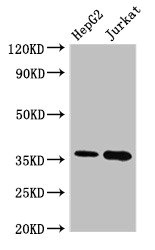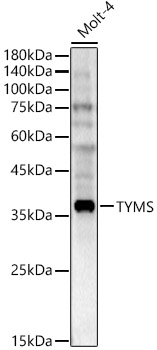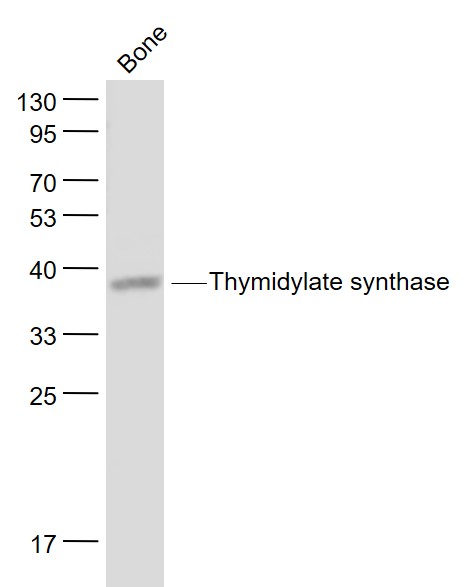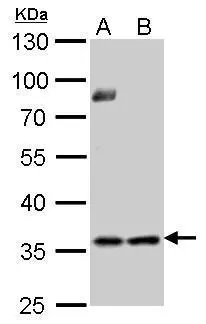![Zebrafish tissue extract (30 μg) was separated by 12% SDS-PAGE, and the membrane was blotted with Thymidylate synthetase antibody [N3C3] (GTX113289) diluted at 1:500. Zebrafish tissue extract (30 μg) was separated by 12% SDS-PAGE, and the membrane was blotted with Thymidylate synthetase antibody [N3C3] (GTX113289) diluted at 1:500.](https://www.genetex.com/upload/website/prouct_img/normal/GTX113289/GTX113289_42480_20160519_WB_Z_eye_22111423_672.webp)
Zebrafish tissue extract (30 μg) was separated by 12% SDS-PAGE, and the membrane was blotted with Thymidylate synthetase antibody [N3C3] (GTX113289) diluted at 1:500.
Thymidylate synthase antibody [N3C3]
GTX113289
ApplicationsWestern Blot
Product group Antibodies
ReactivityHuman, Zebra Fish
TargetTYMS
Overview
- SupplierGeneTex
- Product NameThymidylate synthase antibody [N3C3]
- Delivery Days Customer9
- Application Supplier NoteWB: 1:500-1:3000. *Optimal dilutions/concentrations should be determined by the researcher.Not tested in other applications.
- ApplicationsWestern Blot
- CertificationResearch Use Only
- ClonalityPolyclonal
- Concentration0.53 mg/ml
- ConjugateUnconjugated
- Gene ID7298
- Target nameTYMS
- Target descriptionthymidylate synthetase
- Target synonymsDKCD, HST422, TMS, TS, thymidylate synthase, TSase
- HostRabbit
- IsotypeIgG
- Protein IDP04818
- Protein NameThymidylate synthase
- Scientific DescriptionThymidylate synthase catalyzes the methylation of deoxyuridylate to deoxythymidylate using 5,10-methylenetetrahydrofolate (methylene-THF) as a cofactor. This function maintains the dTMP (thymidine-5-prime monophosphate) pool critical for DNA replication and repair. The enzyme has been of interest as a target for cancer chemotherapeutic agents. It is considered to be the primary site of action for 5-fluorouracil, 5-fluoro-2-prime-deoxyuridine, and some folate analogs. Expression of this gene and that of a naturally occuring antisense transcript rTSalpha (GeneID:55556) vary inversely when cell-growth progresses from late-log to plateau phase. [provided by RefSeq]
- ReactivityHuman, Zebra Fish
- Storage Instruction-20°C or -80°C,2°C to 8°C
- UNSPSC41116161

![Whole cell extract (30 μg) was separated by 12% SDS-PAGE, and the membrane was blotted with Thymidylate synthetase antibody [N3C3] (GTX113289) diluted at 1:1000. Whole cell extract (30 μg) was separated by 12% SDS-PAGE, and the membrane was blotted with Thymidylate synthetase antibody [N3C3] (GTX113289) diluted at 1:1000.](https://www.genetex.com/upload/website/prouct_img/normal/GTX113289/GTX113289_42480_20160519_WB_w_23060501_272.webp)







![IHC-P analysis of human spleen tissue using GTX639929 Thymidylate synthase antibody [HMV305] HistoMAX?. Moderate to strong thymidylate synthase staining of a fraction of lymphocytic cells.](https://www.genetex.com/upload/website/prouct_img/normal/GTX639929/GTX639929_20240403_IHC-P_1_24040301_669.webp)
